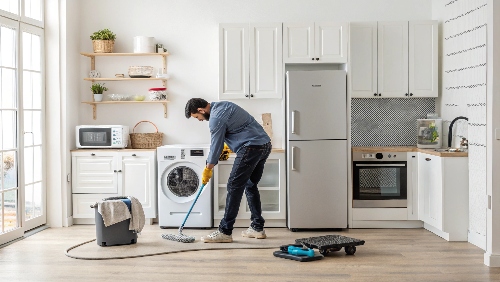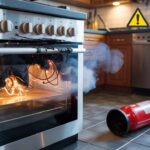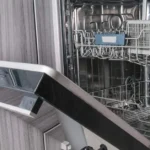Appliances are a significant investment in any home, and yet, they often don’t last as long as we’d hope. Over time, wear and tear can reduce their efficiency, leading to costly repairs or replacements.
Contrary to the common perception that modern appliances are built to fail sooner, this data shows that, for most categories, lifespans have remained stable or even slightly increased. Only washing machines and ovens have experienced shorter lifespans in recent years.
Thankfully, with a few simple care routines, you can extend the life of your appliances and avoid unnecessary repairs. Regular cleaning, timely servicing, and smart usage can keep your appliances running smoothly for years to come. Keep reading to discover the best tips to protect your home’s essential tools.
Maintenance Tips to Extend the Life of Your Home Appliances and Systems in Florida
Homeownership comes with many responsibilities, and maintaining your home is one of the most important. Regular maintenance not only prevents costly repairs but also ensures your home remains comfortable and functional for years to come. Here are some easy ways to keep your home in top shape and extend its lifespan. For expert guidance and tips on how to care for your appliances, Beach 2 Bay Appliances has the knowledge and experience to help you keep your home running smoothly.
Refrigerator Maintenance
Keep the Coils Clean
The condenser coils on your refrigerator are crucial for cooling. Over time, dust and dirt can accumulate on them, restricting airflow and causing your fridge to work harder. Clean the coils every few months to improve efficiency and prolong the life of your appliance. A simple wipe with a dust cloth or a vacuum with a brush attachment will suffice.
Check Door Seals Regularly
Your fridge door seal keeps the cold air in and the warm air out. A weak or cracked seal can cause the appliance to overwork, leading to higher energy bills. Check the seals periodically for any damage or buildup, and clean them to ensure a tight fit.
Set the Right Temperature
Maintaining the ideal temperature in your fridge and freezer is essential for food preservation and energy efficiency. Set your fridge to around 37°F and your freezer to 0°F. This ensures your food stays fresh without overloading the system.
Washing Machine Care
Avoid Overloading the Drum
Overloading your washing machine can strain the motor and reduce washing performance. Be sure to load clothes according to the manufacturer’s recommendations. This not only ensures clean clothes but also helps prevent unnecessary wear on your machine.
Regularly Clean the Filter
The filter in your washing machine catches debris and lint, but it can get clogged over time. Regular cleaning of the filter helps maintain your machine’s performance and prevents it from becoming overwhelmed.
Leave the Door Open After Use
To prevent mold and mildew, always leave the washing machine door slightly ajar after use. This allows air to circulate inside and helps the interior dry out between loads.
Dryer Maintenance
Clean the Lint Trap After Every Use
After each use, empty the lint trap in your dryer. A full lint trap can increase drying time and become a fire hazard. Clean it thoroughly before every load to ensure maximum airflow and efficiency.
Check the Vent Hose
The vent hose can become clogged with lint, reducing the dryer’s efficiency. Check the hose every few months and clean it to ensure optimal air flow.
Ensure Proper Leveling
If your dryer is not level, it can cause vibrations that lead to unnecessary wear and tear. Use a level to make sure your dryer is positioned correctly on the floor.
Dishwasher Care
Clean the Filter Regularly
The filter in your dishwasher collects food particles and debris. If it becomes clogged, it can result in poor washing performance. Clean the filter at least once a month to keep your dishes sparkling.
Run Cleaning Cycles with Vinegar
To remove buildup and odors, run a cleaning cycle with a cup of white vinegar placed on the top rack. This helps clear out grime and leaves your dishwasher smelling fresh.
Avoid Overloading
Avoid overloading your dishwasher, as this can prevent proper water circulation and cleaning. Arrange your dishes so that water can reach all surfaces for the best results.
Microwave Care
Wipe Down the Interior After Each Use
To prevent food buildup and odors, wipe down the interior of your microwave after each use. A damp cloth or sponge will keep the appliance clean without damaging it.
Avoid Using Metal Inside
Never place metal items inside the microwave, as they can cause sparks and damage the appliance. Stick to microwave-safe containers and covers.
Regularly Check the Turntable
Ensure the turntable inside your microwave rotates smoothly. A stuck or misaligned turntable can affect the heating performance. Clean it regularly to ensure proper functioning.
Oven and Stove Maintenance
Clean Oven Racks and Burners
Regularly clean your oven racks and burners to prevent grease buildup and ensure efficient cooking. Use a gentle scrub or oven cleaner to remove tough stains and residue.
Calibrate the Oven Temperature
If you notice your oven isn’t cooking as expected, it might need recalibration. An oven thermometer can help you check the accuracy of your temperature settings and make adjustments as needed.
Check Seals and Gaskets
Check the door seals and gaskets on your oven and stove to ensure they’re in good condition. If the seals are cracked or worn, heat can escape, leading to energy waste and inconsistent cooking temperatures.

Common Mistakes to Avoid For Your Appliances In Florida
Neglecting Regular Cleaning
One of the most common mistakes homeowners make is neglecting to clean their appliances regularly. Dirt, dust, and grime can accumulate in areas such as refrigerator coils, dishwasher filters, and washing machine drums, negatively impacting their performance and efficiency. A simple routine cleaning can prevent unnecessary wear and tear, keeping your appliances running smoothly for years to come.
Ignoring Warning Signs
Another mistake is ignoring the warning signs that your appliances are not functioning correctly. Strange noises, leaks, or slow performance are all signals that something might be wrong. Delaying repairs can lead to more serious issues and costly fixes down the line. Pay attention to these signs and address them before they turn into bigger problems.
Overloading Appliances
Overloading appliances, such as washing machines, dishwashers, or dryers, is another common mistake. Too many items in one load can strain the motor, cause poor performance, and even damage the appliance. Follow the manufacturer’s guidelines for load capacity to ensure your appliances are working efficiently and avoid unnecessary wear.
The Benefits of Routine Appliance Care
Proactive maintenance plays a crucial role in extending the lifespan of your appliances. By taking a few simple steps to maintain your appliances regularly, you can prevent costly repairs and reduce the need for early replacements. This ensures that your appliances remain in peak condition and continue to perform efficiently over time.
Ready to Extend the Life of Your Appliances?

Recent research from the Norwegian University of Science and Technology (NTNU) has shown that most large appliances (refrigerators, dishwashers, freezers, tumble dryers) have maintained stable life spans over decades. Taking care of your home’s appliances isn’t just about saving money; it’s about peace of mind.
At Beach 2 Bay Appliance Service in Niceville, FL, we specialize in keeping your appliances running smoothly for years to come. Whether it’s regular maintenance, repair services, or simple tips to improve appliance efficiency, we’re here to help.
Call Beach 2 Bay Appliance at 850-830-8306 today to schedule your appliance tune-up or repair service and give your appliances the care they deserve!
FAQ's for appliance longevity
Yes, some appliances can last 20 years or more with proper care and maintenance. However, this depends on the type of appliance and its frequency of use.
Regular cleaning, servicing, and timely repairs can help extend their lifespan.
Far far away, behind the word mountains, far from the countries Vokalia and Consonantia, there live the blind texts. Separated they live in Bookmarksgrove right at the coast
It depends on the dryer’s condition and the cost of the repair. If the dryer is in good shape and the repair is relatively inexpensive, it might be worth fixing.
However, if the price of the repair is close to or exceeds the cost of a new dryer, replacing it might be a better option.
Author Profile
- John Raymond Hagler
- Beach2Bay Appliances is a trusted name in Florida for professional appliance repair services. Serving homeowners, realtors, and property managers, our experienced team focuses on reducing costly breakdowns and maximizing appliance efficiency. Committed to reliability, transparency, and customer care, we help maintain the value and functionality of homes and rental properties through routine service and urgent repairs.
Latest entries
 BlogsAugust 30, 2025Oven Smells Like Burning While Cooking? Here’s the Solution
BlogsAugust 30, 2025Oven Smells Like Burning While Cooking? Here’s the Solution BlogsAugust 29, 2025Why Your Dishwasher Isn’t Cleaning Dishes and How to Fix It
BlogsAugust 29, 2025Why Your Dishwasher Isn’t Cleaning Dishes and How to Fix It BlogsAugust 29, 20257 Reasons Your Microwave Isn’t Working and How to Fix It Quick
BlogsAugust 29, 20257 Reasons Your Microwave Isn’t Working and How to Fix It Quick BlogsAugust 27, 2025Why Your Refrigerator Isn’t Cooling and How to Fix It
BlogsAugust 27, 2025Why Your Refrigerator Isn’t Cooling and How to Fix It